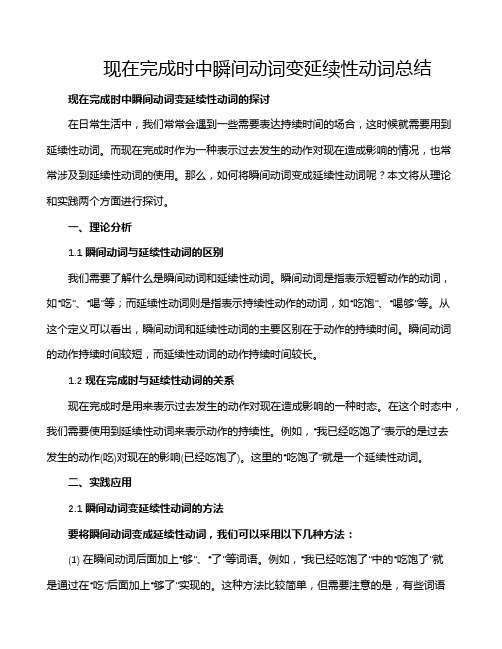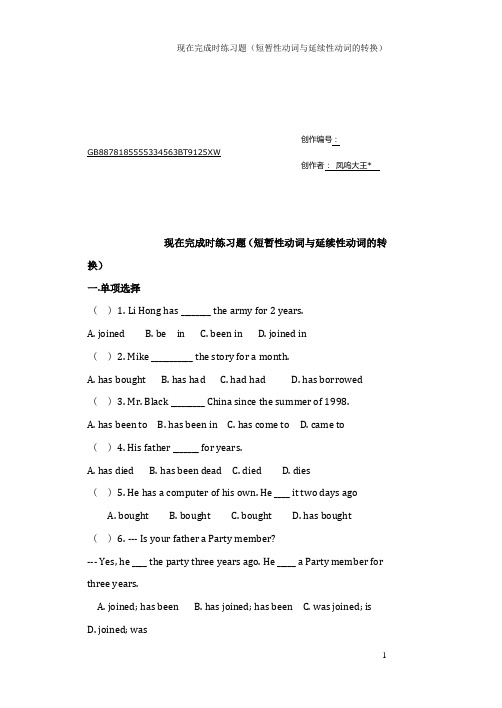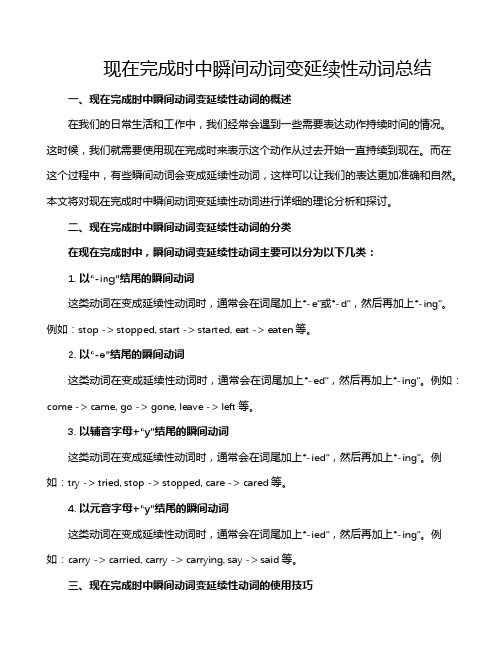初中英语现在完成时瞬间动词变延续动词练习
现在完成时中瞬间动词变延续性动词总结

现在完成时中瞬间动词变延续性动词总结现在完成时中瞬间动词变延续性动词的探讨在日常生活中,我们常常会遇到一些需要表达持续时间的场合,这时候就需要用到延续性动词。
而现在完成时作为一种表示过去发生的动作对现在造成影响的情况,也常常涉及到延续性动词的使用。
那么,如何将瞬间动词变成延续性动词呢?本文将从理论和实践两个方面进行探讨。
一、理论分析1.1 瞬间动词与延续性动词的区别我们需要了解什么是瞬间动词和延续性动词。
瞬间动词是指表示短暂动作的动词,如“吃”、“喝”等;而延续性动词则是指表示持续性动作的动词,如“吃饱”、“喝够”等。
从这个定义可以看出,瞬间动词和延续性动词的主要区别在于动作的持续时间。
瞬间动词的动作持续时间较短,而延续性动词的动作持续时间较长。
1.2 现在完成时与延续性动词的关系现在完成时是用来表示过去发生的动作对现在造成影响的一种时态。
在这个时态中,我们需要使用到延续性动词来表示动作的持续性。
例如,“我已经吃饱了”表示的是过去发生的动作(吃)对现在的影响(已经吃饱了)。
这里的“吃饱了”就是一个延续性动词。
二、实践应用2.1 瞬间动词变延续性动词的方法要将瞬间动词变成延续性动词,我们可以采用以下几种方法:(1) 在瞬间动词后面加上“够”、“了”等词语。
例如,“我已经吃饱了”中的“吃饱了”就是通过在“吃”后面加上“够了”实现的。
这种方法比较简单,但需要注意的是,有些词语并不能直接与瞬间动词搭配,如“看”、“听”等。
这时,我们可以使用“看完”、“听完”等词语来替代。
(2) 将瞬间动词变为动名词。
例如,“我吃完饭就去睡觉”可以改为“我吃完饭后就去睡觉”。
这里,“吃饭”变成了动名词“吃饭”,实现了从瞬间动词到延续性动词的转变。
这种方法适用于大多数情况,但需要注意的是,动名词本身并不具备时态的意义,因此在使用时需要注意上下文的时态。
2.2 现在完成时变延续性动词的例子下面我们通过几个例子来说明如何将现在完成时变为目标时态。
现在完成时练习(短暂性动词与延续性动词的转换)

创作编号:GB8878185555334563BT9125XW创作者:凤呜大王*现在完成时练习题(短暂性动词与延续性动词的转换)一.单项选择()1. Li Hong has ________ the army for 2 years.A. joinedB. be inC. been inD. joined in()2. Mike ___________ the story for a month.A. has boughtB. has hadC. had hadD. has borrowed ()3. Mr. Black _________ China since the summer of 1998.A. has been toB. has been inC. has come toD. came to()4. His father _______ for years.A. has diedB. has been deadC. diedD. dies()5. He has a computer of his own. He ____ it two days agoA. boughtB. boughtC. boughtD. has bought()6. --- Is your father a Party member?--- Yes, he ____ the party three years ago. He _____ a Party member for three years.A. joined; has beenB. has joined; has beenC. was joined; isD. joined; was()7. ---What a nice bike! How lone ____ you ____ it? ----Just five weeks.A. will; buyB. did; buyC. are; havingD. have; had()8. I ______ this book for a week .I have to return it now.A. borrowedB. have borrowedC. keptD. have kept ()9. ----______ your sister _______ in Green China for a long time? ----Yes. She joined it five years ago.A. Has; beenB. Have; beenC. Has; joinedD. Have; joined()10. ---How long have you _______ from the USA? ----For three months.A. come backB. returnedC. go backD. been back ()11. I _____ this book for half a year.A. have boughtB. have hadC. boughtD. had ()12. The students are sorry to hear that famous singer _______ for a year.A. has leftB. has goneC. has been awayD. has gone away()13. He ____ a cold for three days.A. has caughtB. has hadC. has gotD. caught()14. Jim Green ____ in China for two years.A. has comeB. has beenC. has arrivedD. came ()15. The film ____ for half an hour.A. has been onB. has begunC. hasn’t begunD.began()16.How long have you _______ this book?A. Bought B.borrowed C.had D.lent()17.His grandpa _______ for two years.A.was died B.has been dead C.was dead D.has died()18. His sister ______ her hometown for three years. She'll return next year.A.left B.has left C.has been away D.has been away from()19、His father ______ the Party since 1978 .A. joined B. has joined C. was in D. has been in ()20、—Do you know him well ?—Sure .We _________ friends since ten years ago .A. were B. have been C. have become D. have made()21、—How long have you ____ here ?—About two months .A. been B. gone C. come D. arrived()22、Hurry up! The play __________ for ten minutes .A. has begun B. had begunC. has been on D. began()23、 has Mr White been a member of Greener China since he to China?A. How soon, comesB. How often, gotC. How long, cameD. How far, arrived()24、His uncle for more than 9 years.A. has come hereB. has started to workC. has lived thereD. has left the university二.句型转换((每空一词)。
初中英语现在完成时瞬间动词变延续动词练习

学习资料收集于网络,仅供参考学习资料现在完成时瞬间动词变成延续性动词练习一、单项选择。
( )1. We are late . The bus ________ for 20 minutes.A. has leftB. had leftC. has been awayD. had been away( )2. I ______ the League for 5 years so far.A. joinedB. have joinedC. have been inD. have gone to( )3. The factory ______ since the February of 1988.A . has been open B. has opened C. was open D. opened( )4.--How long _____ you _____ ill? -----For two weeks.A. did fallB. have, fellC. have, beenD. have, had( )5. ----- How long can I ______ the book? ------ Two weeks.A. borrowB. lendC. getD.keep( )6. The meeting _______ for a week now.A. has finishedB. has endedC. has been overD. ended( )7. Miss Gao ______ this school for nearly 5 years.A. has been inB. has come toC. has taughtD. taught( )8. Ben ______ a teacher for 4 years .A. has beenB. has becomeC. wasD. became( )9. I ______ home for a week.A. have returnedB. have been backC. returnedD. am returned( )10. Since 2000, he _____ his hometown.A. has leftB. has moved awayC. has been away fromD. left( )11. Tom is ill in hospital. He _______ a cold for several days.A. isB. catchesC. has caughtD. has had( )12. He ________ the car for a week.A. boughtB. has boughtC. has hadD. buy二、完成句子。
现在完成时中瞬间动词变延续性动词总结

现在完成时中瞬间动词变延续性动词总结在我们学习英语的过程中,时态的运用常常让人困惑,尤其是现在完成时。
今天,我们来聊聊瞬间动词和延续性动词在现在完成时中的变化。
这是一个既有趣又富有挑战的话题。
一、瞬间动词的魅力1.1 瞬间动词的定义瞬间动词,顾名思义,是那些动作一闪而过的动词,比如“见”、“吃”、“买”。
想象一下,当你看到一束花,那一瞬间你就“看见”了。
这个“看见”就是瞬间动词的典型。
它发生得很快,转眼就过去了。
比如你说,“我已经见过他了。
”这个“见”就不会有延续的感觉,更多的是一种短暂的经历。
1.2 这种动词在现在完成时的应用用现在完成时来说瞬间动词,其实是为了强调动作的结果。
比如,你可以说,“我已经吃过午餐。
”这句话的重点在于“吃”这个动作完成了,不再是“我正在吃”,因为你已经不在那个时刻了。
这种用法让我们能够轻松地传达某个经历的完成状态,而不是去细聊那个瞬间的过程。
听上去简单,却蕴藏了很多信息。
二、延续性动词的持久性2.1 延续性动词的定义延续性动词则不同,这类动词表示的是一种持续的状态或动作,比如“喜欢”、“等待”、“学习”。
当你说“我已经在学习英语”,这意味着你不仅仅是一次性的学习,而是一个持续的过程。
它带给人一种时间上的延续感。
2.2 现在完成时的特殊效果在现在完成时中,延续性动词常常强调动作的持久性。
比如,“我已经住在这里三年了。
”这句话传达的不仅是住的事实,还有那种与这个地方的连接感。
时间在这里变得重要,像是一条细线,把过去和现在连在一起。
这种用法能让对话更生动,让人更能感受到时间的流逝。
2.3 从瞬间到延续的转变有趣的是,瞬间动词在特定的上下文中也可以转变成延续性动词。
例如,“我已经见过他”变成“我已经在想他”。
这里,虽然“想”是个延续性动词,但它的来源是那一瞬间的“见”。
这样的转变让我们更能感受到人际关系的深度。
三、瞬间与延续的结合3.1 相互交织的魅力在交流中,瞬间动词和延续性动词并不是孤立的。
现在完成时中瞬间动词变延续性动词总结

现在完成时中瞬间动词变延续性动词总结哎呀,你们说说,现在完成时这个东西真是让人头疼啊!简单来说,就是把一个瞬间动词变成一个延续性动词,然后加上一些时间状语。
这听起来好像很简单,但实际上真的是让人抓狂。
今天我就来跟大家聊聊这个话题,希望能帮到大家。
我们来看看什么是现在完成时。
现在完成时就是用来表示从过去到现在的一段时间内发生的动作或者状态。
比如说,“我已经吃过晚饭了”,就是一个现在完成时的句子。
这个句子表示从过去到现在,我一直都没有吃饭。
那么,怎么把一个瞬间动词变成一个延续性动词呢?其实方法很简单,就是在瞬间动词后面加上“过”。
比如说,“我已经吃过晚饭了”,就可以改成“我已经吃过晚饭过了”。
这样一来,原本的瞬间动词就变成了一个延续性动词。
接下来,我们要学会使用一些时间状语来修饰现在完成时。
这些时间状语可以是表示过去的时间的词语,比如“昨天”、“上个月”等等;也可以是表示现在的时间的词语,比如“现在”、“最近”等等。
比如说,“我昨天已经吃过晚饭过了”,就是一个正确的现在完成时的句子。
不过,有时候我们会遇到一些比较复杂的情况。
比如说,我们要表达的是一个动作从过去持续到现在的意思。
这时候,我们就需要用到“一直”这个词。
比如说,“我一直在吃早饭”,就是一个正确的现在完成时的句子。
这个句子表示从过去到现在,我一直都在吃早饭。
除了“一直”之外,还有一些其他的词语也可以用来表示动作的持续。
比如说,“曾经”、“以前”、“曾经一度”等等。
这些词语都可以用来表示动作从过去持续到现在的意思。
比如说,“我曾经一度很喜欢吃辣的食物”,就是一个正确的现在完成时的句子。
这个句子表示从过去到现在,我一直都有喜欢吃辣的食物的习惯。
好了,今天关于现在完成时的讲解就到这里了。
希望大家能够通过这篇文章,对现在完成时有一个更深入的了解。
当然啦,最重要的还是要多加练习,才能够真正掌握这个语法知识。
下次再见啦!。
现在完成时练习(短暂性动词与延续性动词的转换)

现在完成时练习题(短暂性动词与延续性动词的转换)一.单项选择()1. Li Hong has ________ the army for 2 years.A. joinedB. be inC. been inD. joined in()2. Mike ___________ the story for a month.A. has boughtB. has hadC. had hadD. has borrowed()3. Mr. Black _________ China since the summer of 1998.A. has been toB. has been inC. has come toD. came to()4. His father _______ for years.A. has diedB. has been deadC. diedD. dies()5. He has a computer of his own. He ____ it two days agoA. boughtB. boughtC. boughtD. has bought()6. --- Is your father a Party member--- Yes, he ____ the party three years ago. He _____ a Party member for three years.A. joined; has beenB. has joined; has beenC. was joined; isD. joined; was ()7. ---What a nice bike! How lone ____ you ____ it ----Just five weeks.A. will; buyB. did; buyC. are; havingD. have; had()8. I ______ this book for a week .I have to return it now.A. borrowedB. have borrowedC. keptD. have kept()9. ----______ your sister _______ in Green China for a long time----Yes. She joined it five years ago.A. Has; beenB. Have; beenC. Has; joinedD. Have; joined()10. ---How long have you _______ from the USA ----For three months.A. come backB. returnedC. go backD. been back()11. I _____ this book for half a year.A. have boughtB. have hadC. boughtD. had()12. The students are sorry to hear that famous singer _______ for a year.A. has leftB. has goneC. has been awayD. has gone away()13. He ____ a cold for three days.A. has caughtB. has hadC. has gotD. caught()14. Jim Green ____ in China for two years.A. has comeB. has beenC. has arrivedD. came()15. The film ____ for half an hour.A. has been onB. has begunC. hasn’t begunD. began()16.How long have you _______ this bookA. Bought B.borrowed C.had D.lent()17.His grandpa _______ for two years.A.was died B.has been dead C.was dead D.has died ()18. His sister ______ her hometown for three years. She'll return next year.A.left B.has left C.has been away D.has been away from ()19、His father ______ the Party since 1978 .A. joined B. has joined C. was in D. has been in()20、—Do you know him well—Sure .We _________ friends since ten years ago .A. were B. have been C. have become D. have made()21、—How long have you ____ here—About two months .A. been B. gone C. come D. arrived\()22、Hurry up! The play __________ for ten minutes .A. has begun B. had begun C. has been on D. began()23、 has Mr White been a member of Greener China since he to ChinaA. How soon, comesB. How often, gotC. How long, cameD. How far, arrived()24、His uncle for more than 9 years.A. has come hereB. has started to workC. has lived thereD. has left the university二.句型转换((每空一词)。
现在完成时中瞬间动词变延续性动词总结

现在完成时中瞬间动词变延续性动词总结一、现在完成时中瞬间动词变延续性动词的概述在我们的日常生活和工作中,我们经常会遇到一些需要表达动作持续时间的情况。
这时候,我们就需要使用现在完成时来表示这个动作从过去开始一直持续到现在。
而在这个过程中,有些瞬间动词会变成延续性动词,这样可以让我们的表达更加准确和自然。
本文将对现在完成时中瞬间动词变延续性动词进行详细的理论分析和探讨。
二、现在完成时中瞬间动词变延续性动词的分类在现在完成时中,瞬间动词变延续性动词主要可以分为以下几类:1. 以“-ing”结尾的瞬间动词这类动词在变成延续性动词时,通常会在词尾加上“-e”或“-d”,然后再加上“-ing”。
例如:stop -> stopped, start -> started, eat -> eaten等。
2. 以“-e”结尾的瞬间动词这类动词在变成延续性动词时,通常会在词尾加上“-ed”,然后再加上“-ing”。
例如:come -> came, go -> gone, leave -> left等。
3. 以辅音字母+“y”结尾的瞬间动词这类动词在变成延续性动词时,通常会在词尾加上“-ied”,然后再加上“-ing”。
例如:try -> tried, stop -> stopped, care -> cared等。
4. 以元音字母+“y”结尾的瞬间动词这类动词在变成延续性动词时,通常会在词尾加上“-ied”,然后再加上“-ing”。
例如:carry -> carried, carry -> carrying, say -> said等。
三、现在完成时中瞬间动词变延续性动词的使用技巧虽然现在完成时中瞬间动词变延续性动词有很多种类,但是我们在实际使用过程中还是需要注意一些技巧:1. 要注意区分瞬间动词和延续性动词的用法。
有时候,两个词看起来很相似,但实际上它们的用法是不同的。
初中英语现在完成时瞬间动词变延续动词练习

、单项选择。
现在完成时瞬间动词变成延续性动词练习常用瞬间动词变延续性动词表:( )1. We are late . The bus _______ for 20 minu tes.A. has leftB. had leftC. has bee n awayD. had bee n away( )2.1 ______ t he League for 5 years so far.A. jo inedB. have joinedC. have bee n inD. have gone to( )3. The factory _____ since the February of 1988.A . has bee n ope n B. has ope ned C. was ope n D. ope ned( )4.--How long ____ you _____ ill?——For two weeks.A. did fallB. have, fellC. have, beenD. have, had( )5.——How long can I _____ the book? ----------- Two weeks.A. borrowB. le ndC. getD.keep( )6. The meet ing ______ for a week now.A. has fini shedB. has en dedC. has bee n overD. en ded( )7. Miss Gao ______ this school for n early 5 years.A. has bee n inB. has come toC. has taughtD. taught( )8. Ben _____ a teacher for 4 years .A. has bee nB. has becomeC. wasD. became( )9. I ______ h ome for a week.A. have returnedB. have bee n backC. returnedD. am returned( )10. Si nee 2000, he ____ his hometow n.A. has leftB. has moved awayC. has bee n away fromD. left( )11. Tom is ill in hospital. He _______ a cold for several days.A. isB. catchesC. has caughtD. has had( )12. He _______ the car for a week.A. boughtB. has boughtC. has hadD. buy二、完成句子。
- 1、下载文档前请自行甄别文档内容的完整性,平台不提供额外的编辑、内容补充、找答案等附加服务。
- 2、"仅部分预览"的文档,不可在线预览部分如存在完整性等问题,可反馈申请退款(可完整预览的文档不适用该条件!)。
- 3、如文档侵犯您的权益,请联系客服反馈,我们会尽快为您处理(人工客服工作时间:9:00-18:30)。
现在完成时瞬间动词变成延续性动词练习
一、单项选择。
( )1. We are late . The bus ________ for 20 minutes.
A. has left
B. had left
C. has been away
D. had been away
( )2. I ______ the League for 5 years so far.
A. joined
B. have joined
C. have been in
D. have gone to
( )3. The factory ______ since the February of 1988.
A . has been open B. has opened C. was open D. opened
( )4.--How long _____ you _____ ill? -----For two weeks.
A. did fall
B. have, fell
C. have, been
D. have, had
( )5. ----- How long can I ______ the book? ------ Two weeks.
A. borrow
B. lend
C. get
D.keep
( )6. The meeting _______ for a week now.
A. has finished
B. has ended
C. has been over
D. ended
( )7. Miss Gao ______ this school for nearly 5 years.
A. has been in
B. has come to
C. has taught
D. taught
( )8. Ben ______ a teacher for 4 years .
A. has been
B. has become
C. was
D. became
( )9. I ______ home for a week.
A. have returned
B. have been back
C. returned
D. am returned
( )10. Since 2000, he _____ his hometown.
A. has left
B. has moved away
C. has been away from
D. left
( )11. Tom is ill in hospital. He _______ a cold for several days.
A. is
B. catches
C. has caught
D. has had
( )12. He ________ the car for a week.
A. bought
B. has bought
C. has had
D. buy
二、完成句子。
1.I moved to the USA last year.(同义句)
I ________ ________ _______ the USA since _______ ________ .
2.His grandfather died five years ago.(同义句)
His grandfather _________ _________ __________ __________ five years .
3.They borrowed it last week.(同义句)They _________ _________ it since __________ __________.
4.I bought a pen two hours ago.(同义句)I _________ _________ a pen for ________ _________.
5. The film began two minutes ago.(同义句)The film _______ _______ _______ for ________ _______.
6.He left Fuzhou just now.(同义句)
He _______ ________ ______ _________ Fuzhou for five minutes.
7.The meeting finished at six.(同义句)
The meeting ________ ______ ______ for six hours.
8. They married in 1995.(同义句)
①They ________ ________ __________since _________.
②They ________ ________ __________for _________ __________.
9.His brother joined the army three years.(同义句)
His brother________ _________ ________ the army _______ _______ _______ _______. 常用瞬间动词变延续性动词表:
1. have arrived / got to/reached \come/gone/→have been in .…相应的介词
2. have come/gone back/returned → have been back
3. have come/gone out →have been out
4. have become → have been
5. have closed / opened→ have been close d/open
6.have woken/woken up→have been awake
7. have died → have been dead;
8. have left ... → have been away from ...
9. have fallen asleep/got to sleep → have been asleep;
10. have finished/ended/completed → have been over;
11. have married → have been married;
12. have joined ...→ have been in ...\have been a member of...
13. have begun\started → have been on
14. have borrowed/len t →have kept
15. have caught /go t a cold → ha ve had a cold;
16. have bought →have had\owned
17. have moved to ...→have been\lived in /at ...。
